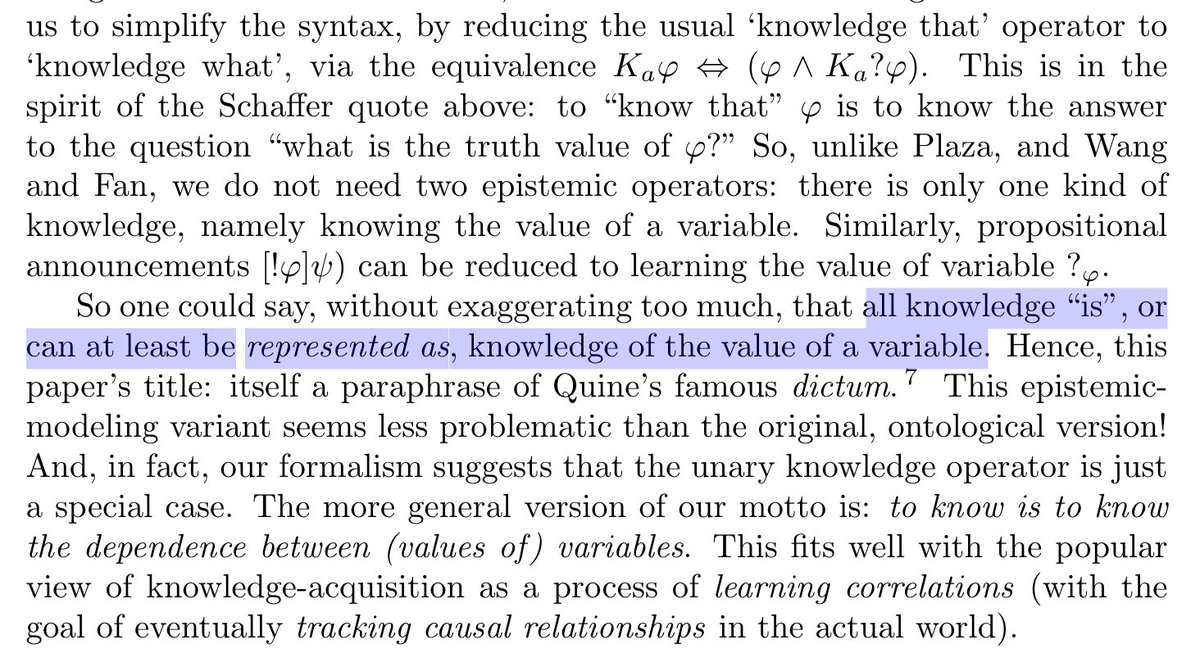“To be is to be the value of a variable”
—Willard Van Orman Quine
—Willard Van Orman Quine
https://twitter.com/mcclure111/status/1306264277687377924
“To be is to be a value of a variable (or to be some values of some variables).”
— George Boolos
cambridge.org/core/journals/…
— George Boolos
cambridge.org/core/journals/…
I only twice attempted to take philosophy classes. Both were mistakes, in different ways. Maybe if I had not made those mistakes, I would not now have such a low opinion of philosophy… nah, it’s objectively rubbish.
Anyway. George Boolos…
Anyway. George Boolos…
Whenever a math class got REALLY INTERESTING, the professor would say “now, if this were a foundations course, we’d ask the following question,” and I’d be like YES YES THAT IS THE QUESTION I WANT ANSWERED, and they’d say “but instead we’ll go through the proof of lemma V.7.c”
Finally I stuck around after class one day and said “so what IS the foundations course, that’s what I want” and the professor looked startled because in 37 years of teaching real analysis no one had ever asked that, and then
and then the professor looked blank, because he realized he had no idea, and mumbled “well maybe the philosophy department has something, or you could try Harvard,” and walked away as fast as he could.
So George Boolos… en.wikipedia.org/wiki/George_Bo…
So George Boolos… en.wikipedia.org/wiki/George_Bo…
So I looked in the course catalogs, and there was nothing and Harvard, and the only thing at MIT was an intro course on philosophical logic, which was George Boolos. I turned up for the first day of classes, during which he introduced 2x2 truth tables and laboriously did AND.
He said that the next class was going to spend an hour on OR, so—having had a pretty decent grasp on predicate calculus since I was twelve—I decided the course was not for me.
Being taught Boolean algebra by Boolos was a fun concept, but only for about thirty seconds.
Being taught Boolean algebra by Boolos was a fun concept, but only for about thirty seconds.
I suspect Boolos was dumbing down too far, misunderestimating MIT philosophy undergrads.
He was a major logician, and could have answered my burning questions about mathematical ontology in a way that would have satisfied me at the time. (I wouldn’t accept those answers now.)
He was a major logician, and could have answered my burning questions about mathematical ontology in a way that would have satisfied me at the time. (I wouldn’t accept those answers now.)
“(or to be some values of some variables)” expresses Boolos’ theory of “plural quantification” which gets at both the foundational problems in mathematics and general philosophical ontology.
“Existential commitment” here is not a pun, exactly…
en.wikipedia.org/wiki/Plural_qu…
“Existential commitment” here is not a pun, exactly…
en.wikipedia.org/wiki/Plural_qu…

It’s difficult now to imagine, but in the mid-20th century, it was perfectly normal to think that the “existence” Sartre talked about and the “existence” of ∃ in mathematical logic were the same thing.
Quine’s “to be is to be the value of a variable” was serious!
Quine’s “to be is to be the value of a variable” was serious!
I get the impression some readers think the “logicist rationalism” I critique in _The Eggplant_ is a straw man, but people are still doing it!
Random example, first that popped out of search engine:
“To Know is to Know the Value of a Variable” aiml.net/volumes/volume…
Random example, first that popped out of search engine:
“To Know is to Know the Value of a Variable” aiml.net/volumes/volume…

Speaking of knowledge, the other philosophy course I attempted to take was J. F. Thompson on epistemology. He was also a logician… I don’t know much about his work, but I suspect I’d have less retroactive respect for him than for Boolos.
en.wikipedia.org/wiki/James_F._…
en.wikipedia.org/wiki/James_F._…
You can see here that he tackled the Big Issues in logicist rationalism (most covered in Part One of _The Eggplant_).
He’s best known for an erroneous mathematical proof that you can’t perform an infinite number of actions in finite time.
Analytic philosophy is deeply silly…
He’s best known for an erroneous mathematical proof that you can’t perform an infinite number of actions in finite time.
Analytic philosophy is deeply silly…

Anyway, in the first lecture of the course, Thompson announced that he was going to demolish skepticism. “For example, a skeptic might say we can’t be sure there isn’t a tiger in the room. But, we can look around and see there isn’t one. So that’s that.”
I am actually more sympathetic to this argument now than when I was twenty, but I still feel that as a philosophical “proof” it lacks a certain something.
At twenty, I thought it was the lamest thing I’d ever heard, and that was the end of my attempts to take philosophy classes.
At twenty, I thought it was the lamest thing I’d ever heard, and that was the end of my attempts to take philosophy classes.
• • •
Missing some Tweet in this thread? You can try to
force a refresh









